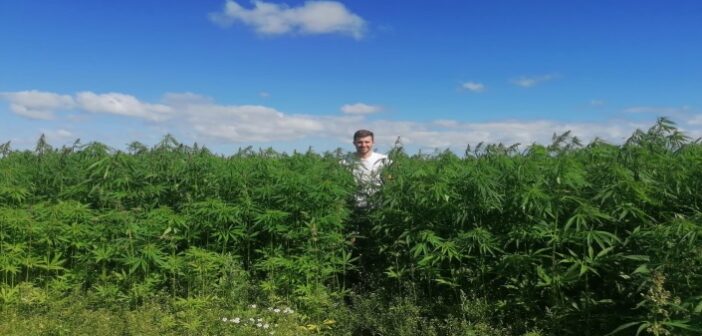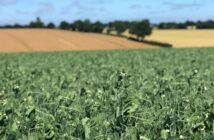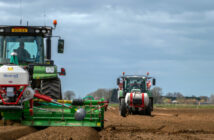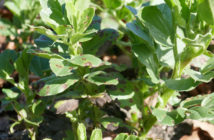After completing a final dissertation in 2019 on the feasibility of growing hemp as a break crop, Hugh Wrangham and business partner, Alistair McLeod, realised that on paper, hemp ticked all the boxes.
After obtaining the necessary licences they established Hemp North, the first hemp crop being sown in 2021. The North Northumberland 600 ha farm grows predominantly winter cereals, OSR and field beans, now in rotation with industrial hemp. “Our objective was to show that hemp is an environmentally friendly and viable diversification option for conventional family farms,” explained Hugh Wrangham. “Grown as a sustainable break-crop hemp delivers four times the CO2 sequestration compared with the same area of forestry, and delivers an additional revenue stream through the sale of British-grown highly nutritious ‘super-food’ hemp seed products.”
Having made the decision to outsource the production of hemp seed oil, they looked at ways of dehulling the hemp on farm and considered several solutions that would deliver hemp hearts.
Another consideration was how the harvested hemp seed would be dried and cleaned before dehulling could take place. To overcome this and preserve quality, McArthur Agriculture supplied the business with a Mecmar drier.
Mr Wrangham and Mr McLeod then visited McArthur Agriculture’s depot in Flixborough to discuss cleaning and dehulling options with director Scott McArthur.
“After a demonstration of the JK Machinery range we realised it provided what we needed to enable us to get our farm diversification project off the ground. It’s robust and easy to operate offering us a cost effective post-harvest solution, including cleaning and dehulling capability, notes Mr Wrangham.
On a relatively low budget and with little knowledge of the necessary process Hemp North designed a DIY dehulling facility with the help and advice from McArthur Agriculture director Scott McArthur,
“Following the company’s advice, we kept the facility modular and relied on gravity feeds and good old-fashioned manual labour to transfer the hemp seed between different processing stages. This allowed us to trial the system, learn the methodology and constantly tweak the parameters to improve yields and efficiencies,” he adds.
Importantly, this gave Hemp North the freedom to process and carefully control quality, whilst developing close relationships with its early customers.
The post-harvest processing starts with the harvested hemp seeds being dried, if necessary, in the Mecmar drier. Once dried, the hemp seeds are cleaned and graded via JK Machinery’s JCC 05 VibroCompact vibratory sieve cleaner before going into store.
As demand dictates the hemp seeds are taken from store and then passed through JK Machinery’s JHI 05 Impact Dehuller. The JHI 05 accelerates the grain which is thrown against the hard surface, the impact causes the grain to shed its outer shell or hull.
The material exiting the dehuller contains hemp hearts (sometimes referred to as kernels), empty hulls and whole hemp seeds. This mix is then passed back through the Vsieve cleaner to remove and separate any whole hemp seeds which are collected and put back through the dehuller.
After passing through the sieve cleaner the remaining material consists of hemp hearts with a small number of empty shells or hulls. This mix then goes over a JK Machinery JGC 03 Gravity Concentrator designed to separate material based on its specific gravity i.e. weight and density.
Having gone through the gravity concentrator the hemp seed is cleaned leaving hemp hearts to be stored. “McArthur Agriculture’s expertise has been invaluable. Before weren’t entirely sure how the post-harvest processing would work, we took some hemp seed to them and they dehulled it for us using the JK Machinery. The company pretty much taught us the process in one afternoon!” states Mr Wrangham.
This successful trial was key because it de-risked North Hemp’s investment in the machinery by reducing the guesswork around the processing. The partners could see that North Hemp would be able to viably produce the hemp hearts.
Despite the steep learning curve and the time Hemp North spent perfecting the post-harvest process, it has quickly established contracts and sales. The farm partnership is rapidly building up its e-commerce site to handle direct sales to consumers, and is seeing growing demand in its wholesale business with online health food stores, local shops and zero-waste stores.
“Now in year two we have begun to automate our dehulling facility. This enables us to increase output and produce dehulled hemp hearts at a volume that allows us to offer increasingly good value to our customers.
“We are continuing to work with McArthur Agriculture so that we can take advantage of its knowledge and expertise in the supply of seed handling equipment. They will work with us to deliver the capability we need to efficiently dry and grade harvested hemp, in larger quantities, on farm. This will mean we can grow more hemp!” concluded Mr Wrangham.




